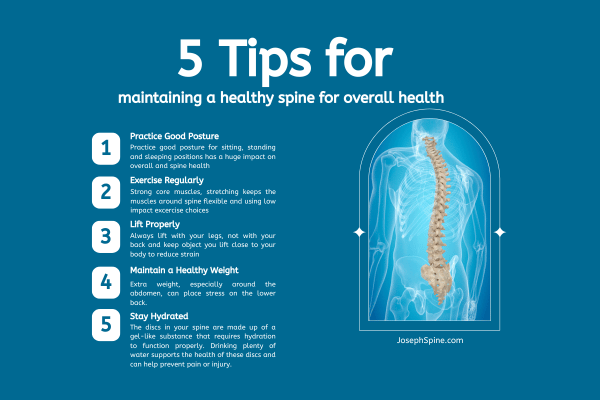Tips for Maintaining a Healthy Spine for Overall Health
Maintaining a healthy spine is essential for overall well-being and mobility. Here are some practical tips to keep your spine in good shape:
1. Practice Good Posture
- Standing: Keep your feet hip-width apart, with your shoulders back and your head aligned with your spine. Avoid slouching or arching your back excessively.
- Sitting: Sit all the way back in your chair with your feet flat on the floor. Keep your knees at or just below hip level and support your lower back with a cushion or lumbar roll if needed.
- Sleeping: Sleep on your side or back with a pillow that supports the natural curve of your neck. Avoid sleeping on your stomach as it can strain your spine.
2. Exercise Regularly
- Strengthen Core Muscles: A strong core supports your spine and helps prevent injuries. Incorporate exercises like planks, bridges, and leg raises.
- Stretching: Regular stretching keeps the muscles around the spine flexible, reducing tension. Focus on your hamstrings, hip flexors, and lower back.
- Low-Impact Activities: Swimming, walking, or cycling are great for spine health without putting too much strain on the joints.
3. Lift Properly
- Use Your Legs, Not Your Back: When lifting objects to protect spine health, bend your knees and squat down to pick things up. Keep your back straight and avoid twisting your torso. Use your leg muscles to lift.
- Keep Objects Close: Hold heavy objects close to your body to reduce the strain on your spine.
4. Maintain a Healthy Weight
- Extra weight, especially around the abdomen, can place stress on the lower back. Eating a balanced diet and staying active helps to manage weight, reducing strain on the spine.
5. Stay Hydrated
- The discs in your spine are made up of a gel-like substance that requires hydration to function properly. Drinking plenty of water supports the health of these discs and can help prevent pain or injury.
6. Quit Smoking
- Smoking reduces blood flow to the spine and discs, making them more susceptible to degeneration. Quitting smoking can help maintain healthy spinal discs and joints.
7. Ergonomic Adjustments
- If you work at a desk, set up your workstation so that your monitor is at eye level, your keyboard and mouse are within easy reach, and your chair supports your lower back. Take breaks every 30-60 minutes to move and stretch.
8. Avoid Prolonged Sitting or Standing
- Prolonged sitting or standing can strain the spine. Alternate between sitting and standing, and make sure you’re maintaining good posture in both positions. Use a standing desk if possible.
9. Use Supportive Footwear
- Wear shoes with adequate arch support to keep your spine aligned. Avoid high heels or shoes with poor support that can cause back problems.
10. Manage Stress
- Emotional stress can lead to muscle tension, particularly in the neck and shoulders, which can affect your spine. Practice relaxation techniques like deep breathing, yoga, or meditation to reduce stress levels.
11. Visit a Chiropractor or Physical Therapist
- Regular visits to a chiropractor or physical therapist can help maintain spinal health, especially if you experience back pain or discomfort. They can provide guidance on exercises, posture, and adjustments to keep your spine aligned.
By integrating these practices into your daily routine, you can help ensure your spine stays strong, flexible, and pain-free.

